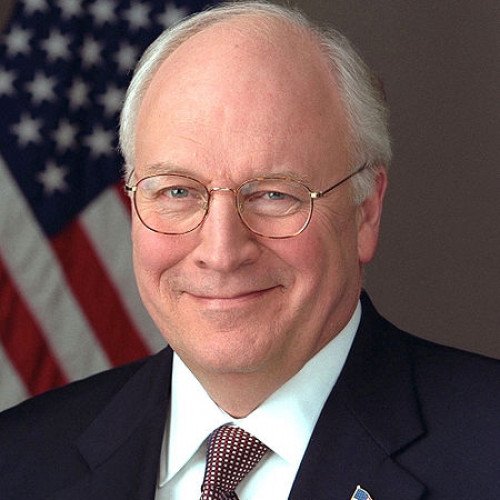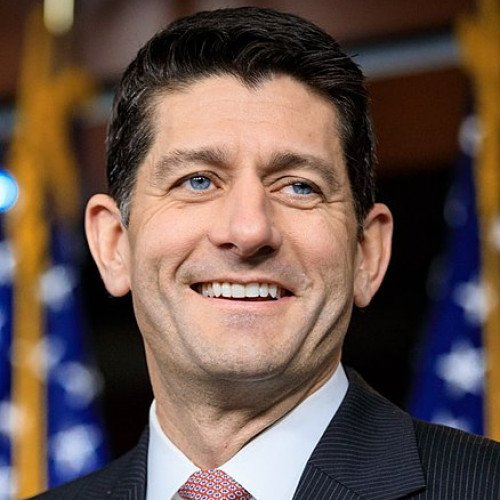Dick Cheney VS Paul Ryan

Dick Cheney
Richard Bruce Cheney ( CHAY-nee; born January 30, 1941) is an American politician and businessman who served as the 46th vice president of the United States from 2001 to 2009 under George W. Bush. He has been cited as the most powerful vice president in American history. He is also one of the most unpopular politicians in the history of the U.S., holding an approval rating of just 13% at the time of leaving office.Born in Lincoln, Nebraska, Cheney grew up there and later in Casper, Wyoming. He attended Yale and then the University of Wyoming, at the latter of which he earned a BA and an MA in Political Science. He began his political career as an intern for Congressman William A. Steiger, eventually working his way into the White House during the Nixon and Ford administrations. He served as White House chief of staff from 1975 to 1977. In 1978, Cheney was elected to the U.S. House of Representatives. He represented Wyoming's at-large congressional district from 1979 to 1989, briefly serving as House minority whip in 1989. Cheney was selected to be the secretary of defense during the presidency of George H. W. Bush, holding the position for the majority of Bush's term from 1989 to 1993. During his time in the Department of Defense, Cheney oversaw the 1991 Operation Desert Storm, among other actions. Out of office during the Clinton administration, Cheney was the Chairman and CEO of Halliburton Company from 1995 to 2000. In July 2000, Cheney was chosen by presumptive Republican presidential nominee George W. Bush as his running mate in the 2000 presidential election. They defeated their Democratic opponents, incumbent Vice President Al Gore and Senator Joe Lieberman. In 2004 Cheney was reelected to his second term as vice president with Bush as president, defeating their Democratic opponents Senators John Kerry and John Edwards. During Cheney's tenure as vice president, he played a leading behind-the-scenes role in the George W. Bush administration's response to the September 11 attacks and coordination of the Global War on Terrorism. He was an early proponent of invading Iraq, alleging that the Saddam Hussein regime possessed a weapons of mass destruction program (no active WMDs were in Iraq) and the Hussein regime had an operational relationship with Al-Qaeda (even though there was scant credible evidence of such a relationship at the time). He also pressured the intelligence community to provide intelligence consistent with the administration's rationales for invading Iraq. Cheney was often criticized for the Bush Administration's policies regarding the campaign against terrorism, and for his support of wiretapping by the National Security Agency (NSA) and of torture. He became at odds with President Bush's position against same-sex marriage in 2004.
Statistics for this Xoptio

Paul Ryan
Paul Davis Ryan (born January 29, 1970) is a retired American politician who served as the 54th speaker of the United States House of Representatives from October 2015 to January 2019. He was also the 2012 vice presidential nominee of the Republican Party, running unsuccessfully alongside Mitt Romney. Ryan, a native of Janesville, Wisconsin, graduated from Miami University in 1992. He spent five years working for Republicans in Washington, D.C. and returned to Wisconsin in 1997 to work at his family's construction company. Ryan was elected to Congress to represent Wisconsin's 1st congressional district the following year, replacing an incumbent Republican who ran for U.S. Senate. Ryan would represent the district for 20 years. He chaired the House Budget Committee from 2011 to 2015 and briefly chaired the House Ways and Means Committee in 2015 prior to being elected Speaker of the House in October 2015 following John Boehner's retirement. A self-proclaimed deficit hawk, Ryan was a major proponent of Social Security privatization in the mid-2000s. In the 2010s, two proposals heavily influenced by Ryan—"The Path to Prosperity" and "A Better Way"—advocated for the privatization of Medicare, the conversion of Medicaid into a block grant program, the repeal of the Affordable Care Act, and significant federal tax cuts. As Speaker, he had a role in passage of the Tax Cuts and Jobs Act of 2017. His other major piece of legislation, the American Health Care Act of 2017, passed the House but failed in the Senate by one vote. Despite his past fiscal conservative rhetoric, Ryan's tenure as Speaker of the House—most of which coincided with a period of unified Republican control of the federal government—saw a significant increase in federal government spending and deficits. Ryan declined to run for re-election in the 2018 midterm elections. With the Democratic Party taking control of the House of Representatives, Nancy Pelosi succeeded Ryan as Speaker of the House.